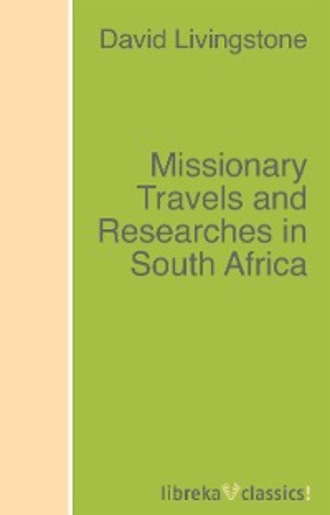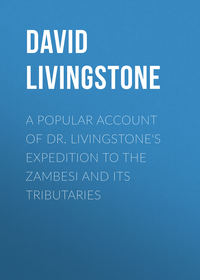
Полная версия
Missionary Travels and Researches in South Africa
The water having at last flowed into the wells we had dug in sufficient quantity to allow a good drink to all our cattle, we departed from Serotli in the afternoon; but as the sun, even in winter, which it now was, is always very powerful by day, the wagons were dragged but slowly through the deep, heavy sand, and we advanced only six miles before sunset. We could only travel in the mornings and evenings, as a single day in the hot sun and heavy sand would have knocked up the oxen. Next day we passed Pepacheu (white tufa), a hollow lined with tufa, in which water sometimes stands, but it was now dry; and at night our trocheamer* showed that we had made but twenty-five miles from Serotli.
Ramotobi was angry at the slowness of our progress, and told us that, as the next water was three days in front, if we traveled so slowly we should never get there at all. The utmost endeavors of the servants, cracking their whips, screaming and beating, got only nineteen miles out of the poor beasts. We had thus proceeded forty-four miles from Serotli; and the oxen were more exhausted by the soft nature of the country, and the thirst, than if they had traveled double the distance over a hard road containing supplies of water: we had, as far as we could judge, still thirty miles more of the same dry work before us. At this season the grass becomes so dry as to crumble to powder in the hands; so the poor beasts stood wearily chewing, without taking a single fresh mouthful, and lowing painfully at the smell of water in our vessels in the wagons. We were all determined to succeed; so we endeavored to save the horses by sending them forward with the guide, as a means of making a desperate effort in case the oxen should fail. Murray went forward with them, while Oswell and I remained to bring the wagons on their trail as far as the cattle could drag them, intending then to send the oxen forward too.
The horses walked quickly away from us; but, on the morning of the third day, when we imagined the steeds must be near the water, we discovered them just alongside the wagons. The guide, having come across the fresh footprints of some Bushmen who had gone in an opposite direction to that which we wished to go, turned aside to follow them. An antelope had been ensnared in one of the Bushmen's pitfalls. Murray followed Ramotobi most trustingly along the Bushmen's spoor, though that led them away from the water we were in search of; witnessed the operation of slaughtering, skinning, and cutting up the antelope; and then, after a hard day's toil, found himself close upon the wagons! The knowledge still retained by Ramotobi of the trackless waste of scrub, through which we were now passing, seemed admirable. For sixty or seventy miles beyond Serotli, one clump of bushes and trees seemed exactly like another; but, as we walked together this morning, he remarked, "When we come to that hollow we shall light upon the highway of Sekomi; and beyond that again lies the River Mokoko;" which, though we passed along it, I could not perceive to be a river-bed at all.
After breakfast, some of the men, who had gone forward on a little path with some footprints of water-loving animals upon it, returned with the joyful tidings of "metse", water, exhibiting the mud on their knees in confirmation of the news being true. It does one's heart good to see the thirsty oxen rush into a pool of delicious rain-water, as this was. In they dash until the water is deep enough to be nearly level with their throat, and then they stand drawing slowly in the long, refreshing mouthfuls, until their formerly collapsed sides distend as if they would burst. So much do they imbibe, that a sudden jerk, when they come out on the bank, makes some of the water run out again from their mouths; but, as they have been days without food too, they very soon commence to graze, and of grass there is always abundance every where. This pool was called Mathuluani; and thankful we were to have obtained so welcome a supply of water.
After giving the cattle a rest at this spot, we proceeded down the dry bed of the River Mokoko. The name refers to the water-bearing stratum before alluded to; and in this ancient bed it bears enough of water to admit of permanent wells in several parts of it. We had now the assurance from Ramotobi that we should suffer no more from thirst. Twice we found rain-water in the Mokoko before we reached Mokokonyani, where the water, generally below ground elsewhere, comes to the surface in a bed of tufa. The adjacent country is all covered with low, thorny scrub, with grass, and here and there clumps of the "wait-a-bit thorn", or 'Acacia detinens'. At Lotlakani (a little reed), another spring three miles farther down, we met with the first Palmyra trees which we had seen in South Africa; they were twenty-six in number.
The ancient Mokoko must have been joined by other rivers below this, for it becomes very broad, and spreads out into a large lake, of which the lake we were now in search of formed but a very small part. We observed that, wherever an ant-eater had made his hole, shells were thrown out with the earth, identical with those now alive in the lake.


